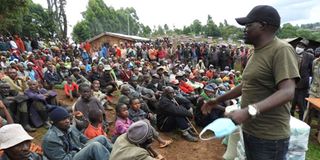Land, politics form potent mix that leads to war in Mau Forest

What you need to know:
- Violence in the region has over time made the Mau Forest conservation efforts a hard nut to crack, with the government at a crossroads over the best way to conduct evictions.
- The government's latest bid to reclaim sections of the forest in Logoman, Sururu, Likia, Kiptunga, Mariashoni, Nessuit, Baraget and Olposmor has been marred by violence, which has derailed the evictions.
- Leaders from the region among them Rift Valley Council of Elders chairman Gilbert Kabage and Ogiek Council of Elders chairman Joseph Towett said that, underneath the ethnic strife, was the enduring feeling of historical injustices, that mainly borders on land allocation.
A potent mix of politics, land grievances and a community caught between unresolved historical injustices, including a bid to regain their ancestral land and a push to protect their culture, are behind the frequent flare-ups of violence in the Eastern Mau, the Nation can reveal.
Violence in the region has over time made the Mau Forest conservation efforts a hard nut to crack, with the government at a crossroads over the best way to conduct evictions with at least 28,500 hectares of the forest land, approximately half of the 57,000-hectare forest block,encroached.
The government's latest bid to reclaim sections of the forest in Logoman, Sururu, Likia, Kiptunga, Mariashoni, Nessuit, Baraget and Olposmor has been marred by violence, which has derailed the evictions.
Key resource
Rift Valley Regional Coordinator George Natembeya insists that no one will be spared in the evictions.
"The government is determined to reclaim the water tower. Nothing will stop that. The Mau Forest is a key resource which must be protected by all means possible. The state can not be intimidated,” said the tough-talking administrator.
However,the government seems to be handling the matter with kid gloves.
For instance in July, the government kicked off evictions on the fringes of the forest but the exercise has stalled. At the onset of the evictions,politicians in Nakuru claimed that the evictions were selective and mainly targeted the poor.
They claimed that residents were not aware where the forest cutline was. Leaders among them MPs Gideon Keter(nominated), Joseph Tonui (Kuresoi South), Liza Chelule (Woman Rep)and Njoro's Charity Kathambi accuse Environment and Forestry Cabinet Secretary Keriako Tobiko of bias.
“We have always tried to share our people’s grievances with Mr Tobiko but he rarely listens. How can a lasting solution be found if he remains adamant? He is the reason why a solution cannot be found,”said Mr Keter.
Historical injustices
More evictions were expected in Nessuit, Tachasis Chepkosa, Sururu and Likia targeting about 20,000 households but the government appears to have applied brakes on the exercise, following months of violence between the Ogiek and the Kipsigis .
Leaders from the region among them Rift Valley Council of Elders chairman Gilbert Kabage and Ogiek Council of Elders chairman Joseph Towett said that, underneath the ethnic strife, was the enduring feeling of historical injustices, that mainly borders on land allocation.
Mr Kabage told the Nation that the government should form a multi-agency team to help in resolving the thorny land issues surrounding the Mau Forest complex.
Mr Towett echoed the sentiments, saying that the Ministry of Environment and Forestry as well as that of Lands should be involved in a joint team to seek a lasting solution to the Mau Forest land question.
“For how long should we kill each other because of unresolved land issues, we need an urgent solution to end the bloodshed in Nakuru and Narok counties. If possible, let those evicted from the forest be given alternative land,” he said.





